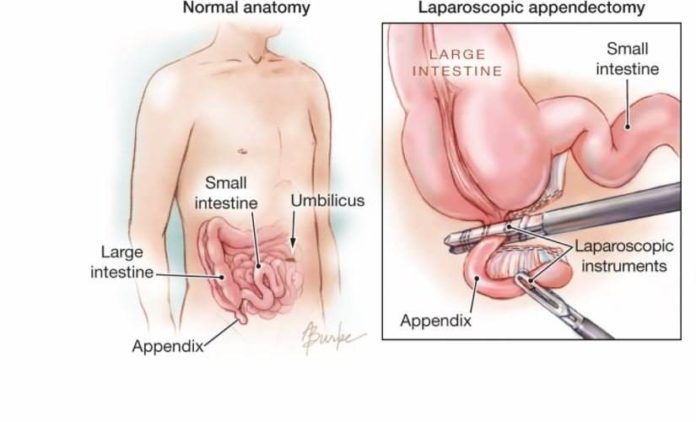What is the recovery time after appendectomy surgery? When can I go back to work? Any quick healing tips for adults, such as diet and pain management?
Here’s your guide to recovering from appendectomy laparoscopic surgery.
The appendix is found in the lower part of the human digestive system. It contains a part of the human immune system that, in most cases, produces antibodies. When the organ becomes inflamed or swollen, a condition called appendicitis occurs. It may leak and infect the abdominal area. In this situation, a surgery called appendectomy is necessary.
Laparoscopic appendectomy surgery
Appendectomy involves two main surgical techniques. The techniques include open and laparoscopic appendectomy. The discussion in this will article will, however, center on laparoscopic appendectomy. It is also known by the name keyhole appendectomy.
It involves making three small incisions in the abdomen through which particular instruments are inserted. After that, gas is gently pumped into the abdominal cavity to separate the abdominal wall from the organs. This makes it easier to examine the appendix and internal organs.
The type and nature of operation you have will depend on how severe your appendicitis is. The surgeon will discuss your options with you. If there is anything you want to know or are not clear about, it is essential to ask your doctor or surgeon to explain it in terms you can understand.
A laparoscopic appendectomy may need to become open surgery if the appendix has ruptured.
Once the appendix is accessed, the blood vessels that supply it are clamped, and the appendix is cut and removed. In laparoscopic appendectomy, the appendix is removed through one of the small ‘keyhole’ incisions.
Appendectomy can only be done in the operating room after your skin has been shaved to remove hair and swabbed with a gegerm-killingolution; sterility precautions are taken to prevent infection. The appendix may be removed by an open method or the laparoscopic technique.
Just to compare, the open method requires a 2 to 3-inch incision in the lower right-hand side of the abdomen to remove the appendix. In contrast, the laparoscopic approach uses several small incisions in the abdomen and the use of a laparoscope to visualize and then remove the appendix.
Because an appendectomy is usually an emergency procedure, there is very little that you will be expected to do in order to prepare for the surgery. Typically, you will be placed under general anesthesia for the surgery to go on uninterrupted.
Therefore, it so important to refrain from eating or drinking beforehand since this will reduce your risk of complications from the anesthesia drugs.
Similarly, there are some other things that you ought to do to reduce the risks and likelihood of complications in the course of the surgery. You should make your doctor or the operating surgeon concerning the following conditions:
- A neurologic disease, such as epilepsy
- Heart disease
- If you have any thyroid conditions
- If you have diabetes
- Lung disease, including asthma and emphysema
- Your allergies
The other things that you ought to do are to inform your doctor about your smoking, alcohol, and drug habits, and any supplements, herbal remedies or medications you are taking, such as blood thinners (including aspirin).
When you are in the operating room, the medical personnel prepare adequately for the operation. The staff members will insert an intravenous (IV) line into your arm to provide you with fluids and anesthesia medications.
To help breathe, you will also be intubated, a procedure in which a plastic tube is inserted into your trachea (windpipe) and attached to a breathing machine. Your surgeon will then conduct the appendectomy while you are unconscious.
How long is recovery from an appendectomy
The time you will take to recover from the surgery fully depends on the type of surgery you had. If you had laparoscopic surgery, you would probably recover within a time frame of about 1 to 3 weeks after surgery. In case of an open surgery, it might take 2 to 4 weeks. If your appendix ruptured, you might have a drain in your incision.
The appendectomy recovery time is likely to vary from one person to another, depending on the following factors:
- First of all, the underlying conditions in the body should also affect. For instance, someone with diabetes might have a tougher time healing from the surgery.
- Similarly, the surgery done is a crucial factor, as well. If you undergo a laparoscopic surgery will be in much better shape than those who undergo an open, more serious operation because the laparoscopic surgery involves only a few tiny incisions. Pain is much less, but those who have to have an open operation will take much longer to heal and can even expect to spend several days in the hospital.
- The overall health is a variable in that someone young and strong will heal much faster than someone who is elderly and frail.
- The stage of appendicitis determines as well. In this case, those who get their appendectomy before the appendix bursts will see a much faster appendectomy recovery time. Those who are dealing with a burst appendix will have more extensive surgery, as well as the risk of complications, such as infection. These will have to be managed very closely, which can extend recovery time.
In most cases, the recovery time for appendectomy surgery is relatively short. You will be normally allowed to leave the hospital after 1 to two days after the surgery. To get back to work and normal activities, you may need 2 to 4 weeks, depending on the conditions.
If the surgeon only makes a small incision in the belly area during the surgery, you should be able to recover soon and immediately return to normal daily activities. In case the appendix is broken before or during the surgery, recovery time will be longer than usual. Of course, the recovery time is heavily affected by the existence of other possible complications.
Appendectomy recovery in adults
As you age, the body’s immune system is likely to be lower compared to when you were young. This, therefore, has a negative implication on time you will take to recover if you underwent appendectomy surgery. You are therefore bound to take more time to recover than when you were of a young and tender age.
The effect of the lowered immune system is that you are even more prone to other infections that come along the way. This further slows the healing process. It is therefore good that you consider having more care if you are of advanced age.
This will help you greatly to get well in the shortest time possible. Special attention and care will, therefore, be given to you before and afterward.
Tips for quick appendectomy recovery
Derived from the Johns Hopkins Medicine, you could obtain some of the suggestions on how to recover from an appendectomy. The outline below reflects the same:
- If you have adhesive strips, keep them clean and dry. In a few days, they are normally designed to fall off.
- If you have staples or stitches, they will be removed during a follow-up visit with the doctor.
- Make sure you keep the incision dry and clean and follow your doctor’s instructions for bathing.
- Take a pain reliever recommended by your doctor, and while you should engage in light walking and movement, avoid strenuous activity.
- Take care when standing for long periods, as this may make your incision and abdominal muscles ache.
In general, you could reduce the time you are likely to recover or reduce the recovery time by simply observing good hygiene and how you conduct yourself. Tips below are additional to the ones above:
- If you have had open surgery, you have a serious wound that will need to be properly dressed and watched closely for infection.
- If you had a laparoscopic surgery will have smaller incisions and not as much risk of infection; however, they can suffer from serious gas pains and something known as “referred pain” in the shoulder. This pain is caused by trapped gas in the abdomen. You are advised to take medications that relieve pressure.
- Some people might experience constipation, not only from the surgery but from the painkillers as well. A stool softener can help alleviate this problem. It is also important to take medication for pain only when you need it.
- Appendectomy recovery time might be lengthened by being too active too soon. Therefore, you will need to take it easy for a few weeks. This means no strenuous exercise, no lifting of heavy objects, and other restrictions that your doctor might impose.
- You may like to use a mild laxative for the first few days.
- Drink plenty of water every day to help prevent constipation.
- Make sure you have adequate rest. A fast lifestyle, with an inadequate diet, will slow your recovery.
- Avoid lifting heavy objects and stair climbing, so that you don’t strain your abdominal muscles.
- After a few days, slowly resume your normal activities. Include regular, gentle exercise.
Appendectomy recovery diet
You might not be interested or have the appetite to eat after the surgery because of the experience of abdominal pain, nausea, vomiting, or diarrhea before surgery. An appendectomy is usually performed because your appendix has become infected or burst open.
Indeed, what you eat after surgery is essential to promote healing and prevent infection. You are not likely to eat the normal diet that you perhaps used to. Your diet is likely to be slightly different. Your doctor should be able to advise appropriately. You are expected to take your body through a gradual process of healing.
Start with the easy to digest foods

After just having abdominal surgery, the best foods to eat are those that are easy to digest, according to the University of Wisconsin Hospital. The foods that could look at include:
- Cream of wheat,
- Milk,
- yogurt
- Cream soups.
This particular diet is known as a full liquid diet and is considered a transitional diet because you eat it for a while before adding in other foods. While this diet does provide some protein and calcium, it is very low in other essential nutrients such as iron, vitamin A and thiamine and should only be consumed for a short time, following your doctor’s recommendations.
Eat all the groups of foods
If you do not have any abdominal pain, nausea, vomiting, or diarrhea after a short time on a transitional, you should be able to resume your usual diet in a few days.
To promote healing after having your appendix removed, it’s crucial to eat a variety of nutrient-rich foods from all the food groups. This is because your body needs a supply of these nutrients to help produce new cells that are important in healing the surgical site and preventing any further complications.
To ensure you get a full supply of nutrients, add whole grains, a variety of fruits and vegetables, low-fat dairy foods, and lean sources of protein such as poultry, seafood, tofu, and beans to your daily diet.
Eat the foods that are good for healing
The consumption of a balanced diet ensures that your body gets adequate amounts of protein, carbs, and fat. Each of these nutrients has a vital role in carrying out. For instance, protein supports the formation of collagen, which is an important part of connective tissue that fills in the incision site.
On the other hand, carbs provide the energy to create new tissue and blood vessels. Healthy carb choices to eat after an appendectomy include beans, whole-wheat bread, brown rice, and fruits or vegetables. Fat is necessary for membranes for new cells and can also help reduce inflammation. Choose heart-healthy sources of fat, such as olive oil, nuts, seeds, and avocados.
Eat foods that help in boosting your immune system
Eating the right foods ensures your body gets the vitamins and minerals it needs to keep your immune system healthy and strong to prevent or fight off other infections. Vitamin A protects you from infection by helping maintain the integrity of your digestive and respiratory systems.
On the other hand, vitamin C is necessary for the production of antibodies and the antioxidant properties in vitamin E protect your cells from damage by free radicals, which can damage cellular membranes and DNA, and raise your risk of illness. Leafy greens and red peppers help you meet both your vitamin A and C needs, while almonds and spinach are rich in vitamin E.
To add on that, zinc also helps your body fight off infection because it is necessary for the formation of white blood cells that help make antibodies and perform other immune functions. It also helps maintain skin integrity. Seafood, milk, whole grains, beans, and nuts are all good sources of zinc.
Drink clear fluids

After any surgery, the gastrointestinal tract may wake up slowly. Sticking with a clear liquid diet is best until all nausea and vomiting pass after waking up from anesthesia. Clear liquids consist of foods and beverages such as apple juice, clear soda, broth, and gelatin. If a medical professional hears healthy bowel sounds with a stethoscope, and you can tolerate clear liquids, advancing the diet to bland foods is usually very ideal.
Go for a soft diet
As the body continues to recover from surgery, eating soft, bland foods will allow the intestines to heal without additional stress. Bland foods include potatoes, rice, and cooked chicken. Always avoid spicy, greasy, and fatty foods, as this may help prevent gastrointestinal distress when recovering from an appendectomy.
Foods that produce intestinal gas, such as beans, may increase the pain associated with having a laparoscopic appendectomy because the surgeon fills the abdomen with air during the operation. After surgery, you are likely to feel gas pains. Eating a healthy diet will help speed the healing process and lower the risk of postoperative infection.
Eat high fiber foods
Risk factors, such as decreased walking and pain medications, may cause a person to experience constipation after an appendectomy. Slowly adding high-fiber foods to the diet may help prevent constipation. High-fiber foods include whole grains, beans, dried fruit, and raspberries. Adding too many high-fiber foods to the diet all at one time may increase the risk of developing uncomfortable intestinal gas.
If the need arises, your doctor/surgeon may find it very necessary to advise you on any other diet and recipe that could work for you. The above one just gives you an idea of what you could consider after the surgical procedure.
References
- http://www.medicinenet.com/appendectomy/patient-comments-280.htm
- https://myhealth.alberta.ca/Health/aftercareinformation/pages/conditions.aspx?hwid=ug3573
- http://www.nhs.uk/Conditions/Appendicitis/Pages/Treatment.aspx
- http://www.appendectomyrecovery.net/
- https://www.betterhealth.vic.gov.au/health/conditionsandtreatments/appendectomy
- http://www.hopkinsmedicine.org/healthlibrary/test_procedures/gastroenterology/appendectomy_92,P07686/

